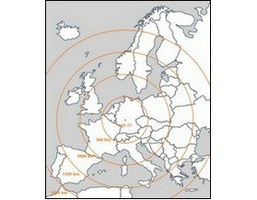DCF77 radio clocks receive the signal of the long-wave radio transmitter DCF77, located in Mainflingen near Frankfurt and transmitting the official time standard of Germany. The time it transmits is the Central-European time, or the Central-European Summer Time (CEST). The signal can be received in most of Europe.
The transmitter is controlled by the atomic clock of the German Federal Institute of Physics and Technology (Physikalisch-Technische Bundesanstalt; PTB) in Braunschweig. It transmits the current time and date information, binary-coded by means of amplitude modulation. The complete information is transmitted every second.
At the beginning of every second, the carrier's amplitude, with a frequency of 77.5 kHz, decreases to 25% of its full value and remains such for 0.1 or 0.2 seconds. The 0.1-second duration represents the logical value of 0, and the 0.2-second duration the logical value of 1. The time and status information and the parity bits are transmitted between the 15th and the 58th second of every minute. In the 59th second there is no amplitude change. This marks that with the next second a new minute will begin.
The DCF77 transmitter's carrier is additionally modulated with a pseudo-random phase noise. The pseudo-random sequence (string ? series) of 512 bits is transmitted by means of the amplitude modulation. The receiver of such signal (PZF) determines the time with a correlation method, which results in a smaller uncertainty, within a few microseconds. This is a much better result than the one obtained with usual amplitude-modulation receivers.

